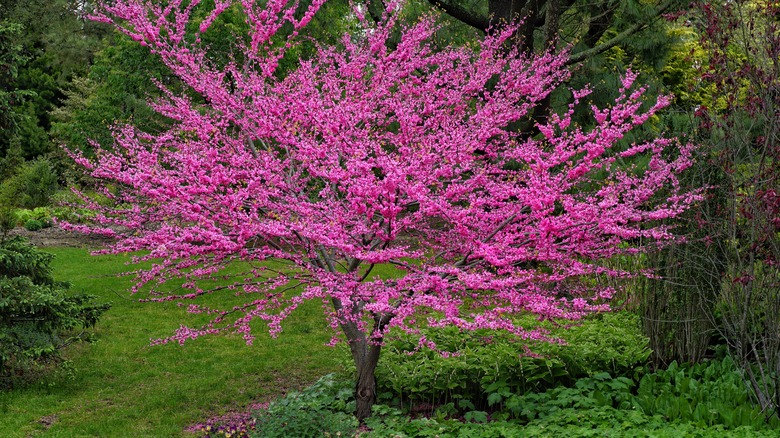Garden Trees, Shrubs & Vines
Danielle Ramos-Sullivan
The Judas tree is a lovely plant for virtually any yard. Beyond being colorful and pleasant to look at, it also actually benefits your garden. In fact, the Judas tree is a valuable pollinator plant, attracting a variety of bees, butterflies, and other insects.
Now, if you thought that this tree was named after Judas Iscariot, the apostle who famously turned his back on Jesus Christ, you’d be correct. His story is typically said to end with him hanging himself from this type of tree following his betrayal, with the Judas trees’ flowers turning their signature purple shade thanks to his blood. However, this type of tree is also known by more lighthearted names like the Mediterranean redbud and the love tree.
Judas trees typically grow to be between 15 and 25 feet tall and 15 and 25 feet wide. They have a rounded crown and smooth, gray bark, and their leaves are light green and resemble hearts. This small, deciduous tree native to southern Europe and western Asia blooms in early spring. Its flowers are pea-shaped and bloom in clusters along the branches before the leaves appear. The flowers are typically a deep pink color, but there are also white-flowered varieties of the tree. And as it turns out, their flowers play a big role in why these trees are so necessary and popular.
Why a Judas tree is a great pollinator

Peter Haynes/Getty Images
There are several reasons why the Judas tree is so attractive to pollinators. First, the flowers are a rich source of nectar (a sugary liquid that provides bees energy) and pollen (a source of protein that helps them grow and reproduce), according to the United Kingdom’s Royal Horticultural Society.
In addition to being rich in pollen and nectar, the shape of these trees makes them easily accessible for pollinators such as bees, butterflies, and birds. The Judas tree’s flowers are open and shallow, making it easy for pollinators to collect the food they need. In doing so, this helps ensure the pollination of the tree. What’s more, the Judas tree has dense foliage, so it can offer a respite for pollinators, especially in hot summer weather. This helps protect them from predators and gives them a place to rest and cool down before and after feeding on the nectar. When all of these factors come together, the Judas tree becomes a necessary respite in these pollinators’ ecosystems.
Early spring bloom helps pollinators
Jarett Thurman/Shutterstock
As if there wasn’t enough to love about Judas trees, their flowers bloom in early spring when there are few other sources of food for pollinators, per an article published by the College of Agricultural Studies at The University of Pennsylvania. This makes it an important food source for pollinators who are hungry and searching for a meal at this time, and it’s especially true in the early spring when pollinators are emerging from hibernation and need food to rebuild their energy reserves.
Another advantage is that Judas trees’ flowers are brightly colored and quite fragrant, which helps attract pollinators from a distance. The flowers’ bright colors are particularly attractive to bees — more specifically, our striped friends are drawn toward purple and violet flowers, according to an article published by The University of Illinois Urbana-Champaign — while the sweet fragrance of the flowers helps attract butterflies and other insects to boot. It’s also a relatively easy-to-care-for tree, which makes it a good choice for novice gardeners.
For all of these reasons, if you’re looking for a beautiful tree to bring more pollinators to your garden, the Judas tree is undoubtedly a great option, with it being very clear why so many declare it their favorite tree.